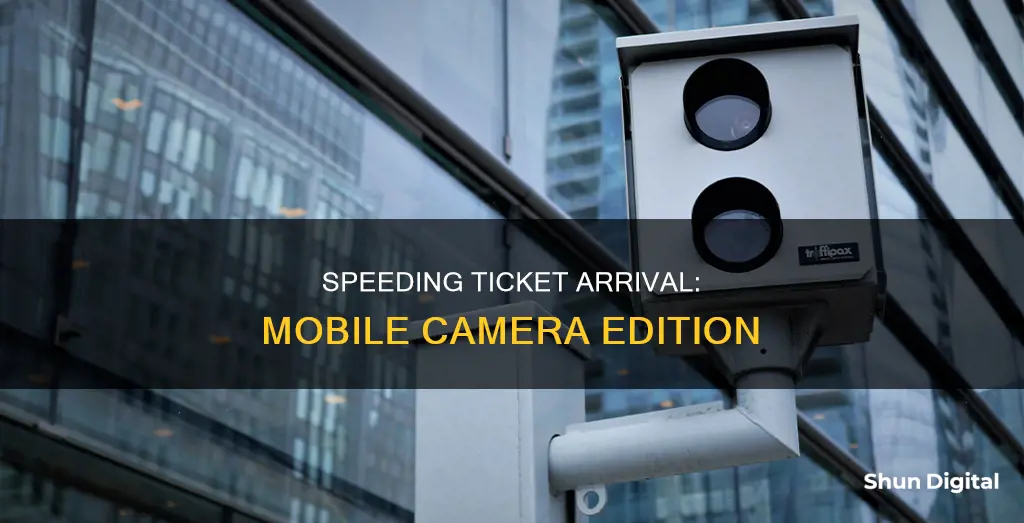
If you've been caught speeding by a mobile camera, you're probably wondering when the speeding ticket will arrive. In the UK, you should expect to receive your speeding ticket within 14 days of the offence if you are the registered keeper of the vehicle. This 14-day window starts from the day of your speeding offence, and the postmark on the letter should fall within this period.
| Characteristics | Values |
|---|---|
| Time to receive a speeding ticket | Within 14 days of the offence |
| Start date of the 14-day window | The day you were caught speeding |
| Notice of Intended Prosecution (NIP) | Received within 14 days |
| Section 172 notice | Received with the NIP |
| Penalty for ignoring Section 172 notice | Summoned to court for additional charges |
| Fine for speeding | Minimum of £100 |
| Penalty points | 3 points added to the driving licence |
What You'll Learn
- The ticket arrives within 14 days of the offence
- The ticket is accompanied by a Notice of Intended Prosecution
- Failure to return the notice within 28 days can lead to further charges
- A Fixed Penalty Notice is sent after the initial notice is returned
- The minimum penalty for speeding in the UK is a £100 fine and three points

The ticket arrives within 14 days of the offence
If you are the registered keeper of a vehicle caught speeding by a mobile camera unit, you should expect to receive your speeding ticket within 14 days of the offence. This two-week window starts from the day you were caught speeding, and the postmark on the letter should fall within this period.
The first document you'll receive is the Notice of Intended Prosecution (NIP/Section 172 notice). This serves as a formal warning that you may be prosecuted for the offence and requires you to confirm the details of the driver at the time of the incident. It is important to take notice of this, as failing to return the NIP within 28 days could lead to further charges.
Once you've returned the Section 172 notice, you will receive a Fixed Penalty Notice. This will include a fine and penalty points added to your driving licence. It is a straightforward process for minor offences, but penalties can escalate for more severe speeding violations.
If you are offered the option, you may be able to take a speed awareness course as an alternative to paying a fine. This is a one-day workshop that educates drivers about the dangers of speeding and offers tips for safer driving. However, eligibility depends on the severity of the offence and is often at the discretion of the police force.
Overcharging Camera Batteries: Good, Bad, or Indifferent?
You may want to see also

The ticket is accompanied by a Notice of Intended Prosecution
If you are caught speeding by a mobile camera, you should expect to receive a ticket within 14 days of the offence. This ticket will be sent to the registered keeper of the vehicle and will include a Notice of Intended Prosecution (NIP) and a Section 172 notice.
The NIP is a formal warning that you may be prosecuted for the offence and it is important to take this seriously. Even if the police do not intend to prosecute, the NIP enables them to do so if they decide to. The notice will be sent to the address where the vehicle is registered, so it is important to identify who was driving at the time of the offence and return the Section 172 notice within 28 days. Failing to do so could result in further charges and a fine of up to £1,000 and six penalty points on your driving licence.
The Section 172 notice requires you to confirm the details of the driver at the time of the incident. This is a crucial step, as failing to return this notice within the stipulated timeframe could lead to additional charges and a court summons.
Once you've returned the Section 172 notice, you will receive either a Fixed Penalty Notice or a letter telling you to go to court. The minimum penalty for speeding in the UK is a £100 fine, along with three penalty points added to your driving licence. It is important to understand that these are just the minimum penalties and the consequences can escalate, especially if you have only recently passed your driving test.
If you are offered the option of attending a speed awareness course instead of receiving the standard penalties, it may be worth considering. This alternative is not always available and is usually dependent on the discretion of the police force, the severity of the offence, and whether you have taken a similar course in the past. While the course may save you from a fine and penalty points, it does come with its own cost, typically around the same price as the standard fine.
How Night Mode Captures the Dark
You may want to see also

Failure to return the notice within 28 days can lead to further charges
If you have been caught speeding, you should expect to receive a Notice of Intended Prosecution (NIP) and a Section 172 notice within 14 days of the offence. The NIP serves as a formal warning that you may be prosecuted for speeding and requires you to confirm the details of the driver at the time of the incident. This is a crucial step, as failing to return this notice within 28 days could lead to further legal consequences.
The Section 172 notice is not something that can be ignored. It is a legal requirement to respond to this notice within the stipulated timeframe. Failure to do so could result in a court summons and additional charges for failing to provide the necessary information. The penalties for not complying with the NIP can be severe, including a fine of up to £1000 and 6 penalty points.
The 28-day period starts from the date of receiving the notice and is deemed to be 2 working days after it is posted. During this time, you can make enquiries about the driver's identity, seek legal advice, or request more information from the police. It is important to respond promptly and provide all the information within your knowledge, even if you cannot fully complete the notice.
If you are the registered keeper of the vehicle, it is your responsibility to ensure that the DVLA has your correct and up-to-date address details. Failure to do so will not be considered a 'reasonable excuse' under the law if the notice is sent to an old address.
In most cases, the police will send a reminder if no response is received to the first notice. However, it is important to take these notices seriously and respond within the required timeframe to avoid any further legal complications.
Shutter Mode Simplified: Easy Steps for Canon Cameras
You may want to see also

A Fixed Penalty Notice is sent after the initial notice is returned
If you've been caught speeding, you should expect to receive a Notice of Intended Prosecution (NIP) in the post within 14 days of the offence. This NIP serves as a formal warning that you may be prosecuted for speeding and requires you to confirm the details of the driver at the time of the incident. It is important to take this step seriously and respond within 28 days, as failing to do so could lead to further charges.
Once you've returned the NIP, the next step in the process is receiving a Fixed Penalty Notice. This notice will outline the specific penalty you are facing for speeding. In the UK, the minimum penalty for speeding is a £100 fine, along with three penalty points added to your driving licence. It is worth noting that penalties can escalate depending on the severity of the offence.
The Fixed Penalty Notice should be sent within six months of the offence. While the police have this timeframe to issue the notice, it is usually sent sooner. It's important to understand that receiving the NIP within 14 days is a requirement for prosecution, and if it is not received within this timeframe, the driver cannot be prosecuted for the offence.
The process following a speeding offence can be stressful and time-consuming. It is important to take prompt action and carefully consider your options for addressing the penalty.
Quickly Copy Adjustments: Camera Raw Secrets
You may want to see also

The minimum penalty for speeding in the UK is a £100 fine and three points
In the UK, the minimum penalty for speeding is a £100 fine and three points added to your driving licence. This is known as a Fixed Penalty Notice (FPN). You will also be sent a Notice of Intended Prosecution (NIP) within 14 days of the date of the offence, which will be sent to the address of the registered keeper of the vehicle. This will be followed by a Section 172 notice, which requires you to confirm the details of the driver at the time of the incident. It is important to return this within 28 days, as failure to do so could result in further charges or a court summons.
Once you have returned the Section 172 notice, you will receive your FPN. You can then choose to plead guilty and pay the fine, or plead not guilty and take the matter to court. If you plead not guilty and are found guilty in court, you may face a higher fine and more penalty points. The amount you are fined will depend on the speed limit and how much you exceeded it, and it is usually calculated as a percentage of your weekly income.
In some cases, you may be offered the option to attend a speed awareness course instead of paying the fine and receiving penalty points. This alternative is not always available and depends on factors such as the severity of the offence and whether you have taken a similar course recently. The course typically lasts for a day and focuses on educating drivers about the dangers of speeding and promoting safer driving practices. While it can help you avoid the standard penalties, the course is not free and you will need to pay a fee to attend.
It is important to note that speeding is a serious offence that can have significant consequences. In addition to the financial penalties and licence points, speeding increases the risk to yourself and other road users. Therefore, it is essential to obey speed limits and drive with caution to ensure the safety of everyone on the road.
Nextrend Camera Systems: Where Are They Manufactured?
You may want to see also
Frequently asked questions
You should expect to receive your speeding ticket within 14 days of the offence if you are the registered owner of the vehicle. This 14-day window starts from the day you were caught speeding, and the postmark on the letter should fall within this period.
The ticket comes with a set of paperwork that needs to be sorted out quickly. The first document is the Notice of Intended Prosecution (NIP/Section 172 notice), which serves as a formal warning that you may be prosecuted for the offence and requires you to confirm the driver's details at the time of the incident. Failing to return this notice within 28 days could lead to further charges.
The minimal penalty for speeding in the UK is a £100 fine, along with three penalty points added to your driving licence. It's a simple process for minor offences, but penalties can escalate.







